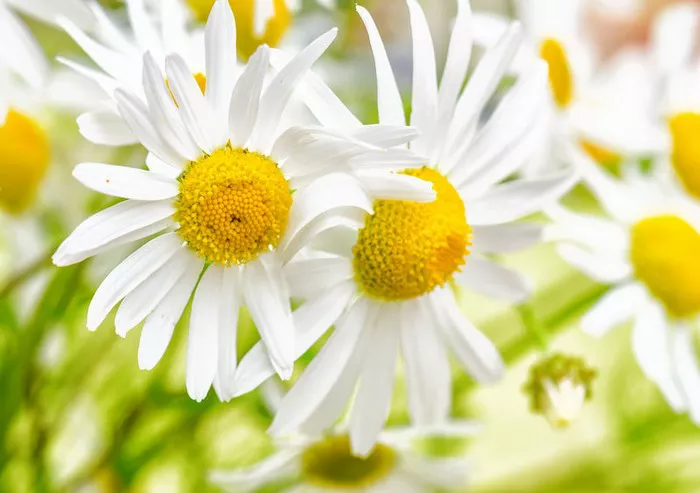Chamomile, with its delicate daisy-like flowers and subtle apple-like aroma, has been revered for centuries for its medicinal properties and its culinary uses. Commonly consumed as a soothing tea, chamomile is also finding its way into various culinary dishes, including salads, desserts, and even savory dishes. However, as with any edible flower, there are considerations regarding safety and potential side effects. In this article, we delve into the safety of consuming chamomile flowers and explore the potential benefits and risks associated with their consumption.
Understanding Chamomile
Chamomile is a flowering plant that belongs to the Asteraceae family. There are two primary species of chamomile that are commonly used for medicinal and culinary purposes: German chamomile (Matricaria chamomilla or Matricaria recutita) and Roman chamomile (Chamaemelum nobile). Both species have similar appearances and properties, though they are distinct in their habitats and some chemical compositions.
Chamomile has a long history of use in traditional medicine, dating back to ancient civilizations such as the Egyptians, Greeks, and Romans. It is renowned for its calming and soothing effects, making it a popular choice for promoting relaxation and alleviating stress and anxiety. Additionally, chamomile is valued for its anti-inflammatory, antioxidant, and antimicrobial properties.
Nutritional Profile of Chamomile Flowers
Chamomile flowers contain various bioactive compounds, including flavonoids, terpenoids, and antioxidants. These compounds contribute to the potential health benefits associated with chamomile consumption. However, it’s important to note that chamomile flowers are not a significant source of macronutrients such as carbohydrates, protein, or fat.
Potential Health Benefits
Consuming chamomile flowers may offer several potential health benefits, including:
1. Improved Digestive Health: Chamomile has been traditionally used to aid digestion, alleviate gastrointestinal discomfort, and reduce symptoms of conditions such as indigestion, bloating, and irritable bowel syndrome (IBS).
2. Better Sleep Quality: Chamomile tea is renowned for its calming properties, which may help promote relaxation and improve sleep quality. Drinking chamomile tea before bedtime has been associated with reduced insomnia and better sleep.
3. Reduced Inflammation: The anti-inflammatory properties of chamomile may help alleviate symptoms of inflammatory conditions such as arthritis and skin inflammation.
4. Stress Relief: Chamomile tea is often consumed for its soothing effects, which can help reduce stress and anxiety levels.
5. Antioxidant Protection: The antioxidants present in chamomile flowers may help protect cells from damage caused by free radicals, thereby reducing the risk of chronic diseases such as cancer and cardiovascular disease.
Safety Considerations
While chamomile is generally considered safe for consumption when used in moderation, there are some important considerations to keep in mind:
1. Allergic Reactions: Individuals who are allergic to plants in the Asteraceae family, such as ragweed, marigolds, or daisies, may also be allergic to chamomile. Allergic reactions to chamomile can range from mild skin irritation to severe allergic reactions, including anaphylaxis.
2. Cross-Reactivity: Cross-reactivity between chamomile and other plants or substances is possible. Individuals with known allergies should exercise caution when consuming chamomile products.
3. Drug Interactions: Chamomile may interact with certain medications, including blood thinners, sedatives, and drugs metabolized by the liver. Consultation with a healthcare professional is advisable before consuming chamomile products, especially if you are taking prescription medications.
4. Pregnancy and Lactation: While chamomile tea is generally considered safe for pregnant and breastfeeding women when consumed in moderation, it’s advisable to consult with a healthcare provider before incorporating chamomile into your diet during pregnancy or lactation.
5. Toxicity: Excessive consumption of chamomile tea or supplements may lead to toxicity symptoms, including nausea, vomiting, dizziness, and allergic reactions. It’s important to consume chamomile in moderation and adhere to recommended dosages.
Safe Consumption Practices
To minimize the risk of adverse effects, consider the following tips when consuming chamomile flowers:
1. Source Quality Products: Choose chamomile products from reputable sources to ensure quality and purity.
2. Start Slowly: If you’re new to consuming chamomile, start with small amounts to assess your tolerance and monitor for any adverse reactions.
3. Consult a Healthcare Professional: If you have any underlying health conditions or are taking medications, consult with a healthcare provider before incorporating chamomile into your diet.
4. Monitor for Allergic Reactions: Be vigilant for any signs of allergic reactions, such as itching, swelling, or difficulty breathing, and seek medical attention if necessary.
5. Limit Consumption: While chamomile is generally safe for most people, it’s advisable to consume it in moderation and avoid excessive intake.
Conclusion
Chamomile flowers are not only prized for their soothing aroma and delicate flavor but also for their potential health benefits. When consumed in moderation and with proper precautions, chamomile can be a safe addition to a balanced diet. However, individuals with known allergies or medical conditions should exercise caution and consult with a healthcare professional before incorporating chamomile into their routine. By understanding the safety considerations and practicing responsible consumption, you can enjoy the potential benefits of chamomile flowers while minimizing the risk of adverse effects.


